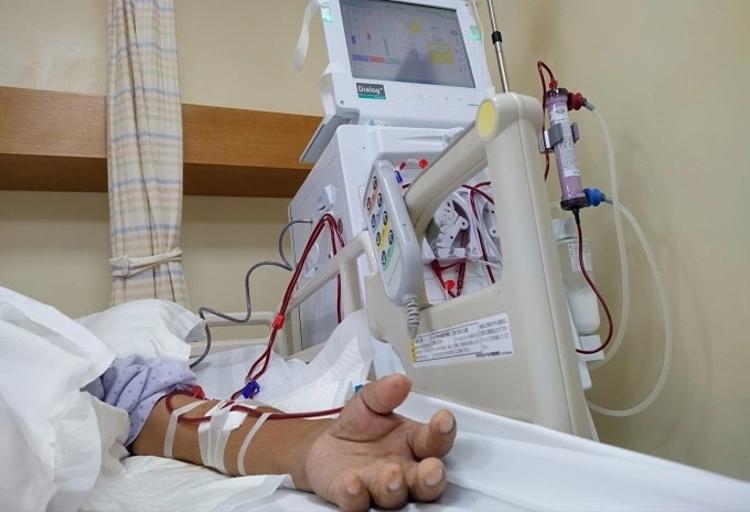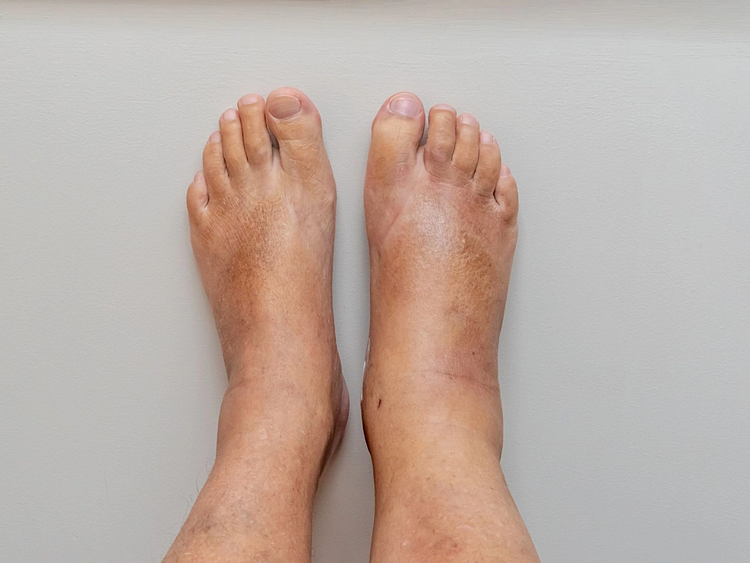"Every dialysis session drains me, but the physical pain is nothing compared to the financial worry," Minh confided on 24/6.
Six months ago, Minh, from Ha Nam, suddenly experienced fatigue, decreased urination, and swelling throughout his body. A diagnosis at Hanoi Medical University Hospital revealed end-stage renal failure, despite his previously clean bill of health. His first visit to the hospital also marked the beginning of emergency dialysis, three times a week.
Each session costs nearly 600,000 VND for dialyzer reuse services, excluding travel, medication, food, and regular check-ups. Having graduated from university not long ago, Minh's health insurance had expired, forcing him to bear the full cost of treatment. Despite trying to find part-time work, his declining health made it impossible.
Minh is on the waiting list for a kidney transplant – the only solution. However, a kidney transplant in Vietnam typically costs hundreds of millions of VND, far beyond the means of his farming family. With his parents ineligible to donate, Minh's hope for survival rests on a miracle.
"I'm not afraid of death, just of being a burden to my loved ones," Minh shared.
 |
A patient undergoing dialysis. Photo: Dinh Tien |
Hoang, a 35-year-old refrigeration technician and former family breadwinner, faced a similar predicament when diagnosed with end-stage renal failure 5 years ago. "I couldn't believe it," he recalled. Life has been turned upside down since he started dialysis.
Initially, Hoang tried to maintain his job, working until late morning before leaving for dialysis. He often felt weak, his skin ashen, and his legs unsteady after treatment, but he persevered.
After 5 years of dialysis, his severely deteriorated health forced him to stop working. His wife now works overtime and sells goods online to cover his medical expenses and support their two children. Monthly costs for medication, travel, and food reach nearly 10 million VND. The family has had to sell their vehicle and borrow money to cope. Occasional support from philanthropists doesn't address the root problem.
"The most painful thing isn't the illness itself, but becoming a burden on my family," Hoang confessed.
The number of young people with chronic kidney disease is rising alarmingly. According to the latest statistics from the Ho Chi Minh City Nephrology Association, about 12.8% of Vietnam's population, or over 8.7 million people, have chronic kidney disease. Approximately 8,000 new cases are diagnosed annually, with the 18-30 age group accounting for 20-30%. Around 800,000 people, 0.1% of the population, require dialysis.
The Inside CKD study across 11 countries shows that annual chronic kidney disease treatment costs reach billions of USD, accounting for 2.4-7.5% of national healthcare spending. In Vietnam, the Health Insurance Fund spends over 4,000 billion VND annually on dialysis, highlighting the immense financial strain on both patients and society.
The cost of a single dialysis session in Vietnam ranges from 700,000 VND to 2,000,000 VND, depending on the healthcare facility and the patient's condition. With health insurance, patients might pay between 150,000 VND and 450,000 VND per session. The maximum health insurance coverage for a session is 543,000 VND. Monthly expenses can therefore range from 2.5 million VND to 12 million VND after insurance, or 12 million VND to 36 million VND for patients needing thrice-weekly dialysis without insurance.
Doctor Nguyen Van Thanh, Deputy Head of the Nephrology-Urology Department at Hanoi Medical University Hospital, emphasizes that young people with end-stage renal failure experience greater emotional distress and financial burdens than older patients. They are in their prime working years, facing disruptions to their education and careers, loss of earning capacity, and dependence on others.
A 2023 survey at Hanoi Kidney Hospital of 510 chronic kidney disease patients found that over 75% desired financial and psychological support. Young patients under 35 face even greater challenges with interrupted education, stalled careers, and the burden they place on their families.
Alarmingly, many are diagnosed only in the final stages. A 2023 study revealed that 68% of patients discovered their condition only when it was irreversible. Chronic kidney disease often progresses silently, making early detection difficult.
 |
Water retention causes swelling in stage 3 kidney disease patients. Photo: Pexels |
Associate Professor, Doctor Nguyen Bach, Head of the Dialysis Department at Thong Nhat Hospital, states that dialysis with quality filters and sufficient duration can prolong life. Many patients can engage in flexible work like online sales or part-time jobs, reducing their financial burden and fostering social inclusion. However, this requires significant community support.
For suitable candidates, home peritoneal dialysis offers an alternative, eliminating thrice-weekly hospital visits. This requires a dedicated room and thorough medical assessment. Automated peritoneal dialysis involves an initial investment of around 200 million VND, though subsequent monthly costs are covered by health insurance.
According to the Ministry of Health, Vietnam has over 400 dialysis units, meeting only about 30% of patient needs. Overcrowding in major hospitals is common, forcing patients to wait or travel long distances for treatment.
The multidisciplinary care model for dialysis patients, first implemented in Vietnam in 2024, offers new hope. It provides medical support, psychological counseling, nutritional guidance, and social assistance, improving overall quality of life. Expanding this model requires greater government investment and societal involvement.
Prevention remains paramount. Experts recommend annual check-ups, especially for high-risk individuals with diabetes, hypertension, kidney stones, or cardiovascular disease, for early detection and effective management. Basic blood and urine tests, along with urinary tract ultrasounds, can identify potential complications.
Furthermore, managing underlying conditions and avoiding unprescribed pain relievers or unregulated herbal remedies are crucial preventive measures.
Thuy Quynh












